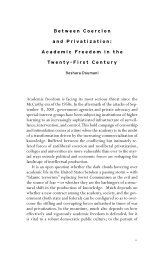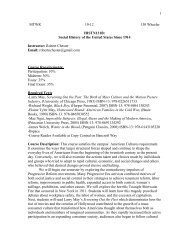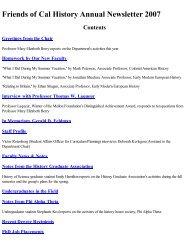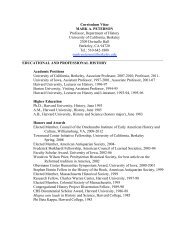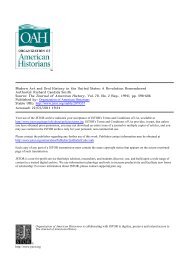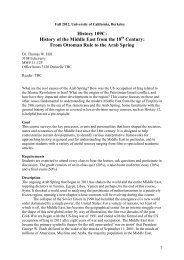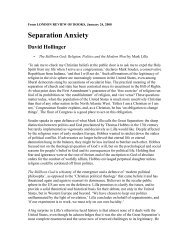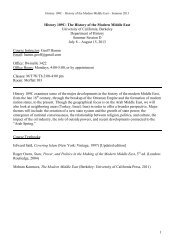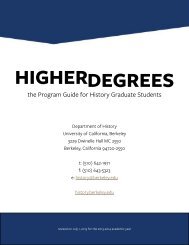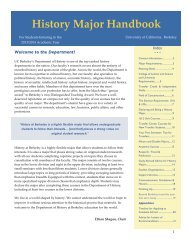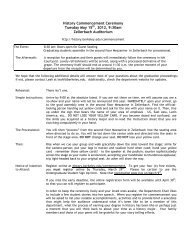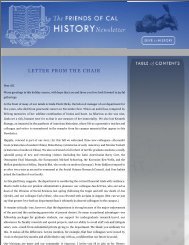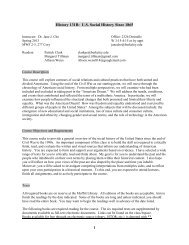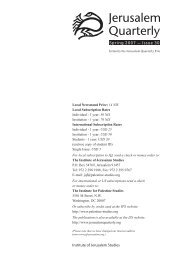the census. This led Turner to reflect on the significance of uninhabited l<strong>and</strong>, which he declared to bethe fostering of the individualism <strong>and</strong> democracy that, he believed, had made the United States what itwas. <strong>The</strong> narrative of the frontier was keyed by the encounter of Europeans with a geographicalenvironment defined by the absence of people. Indians did not really count as people, as their l<strong>and</strong> wasuninhabited by Turner's definition. 75 Yet the narrative of amalgamation is antithetical: it is keyedinstead by the encounter of human beings with each other, across the lines of many communities ofdescent, in a series of intimacies <strong>and</strong> counter-intimacies fostered by a range of economic <strong>and</strong> culturalforces.Hence I invoke Turner not because his ideas are sufficiently alive today to dem<strong>and</strong> refutation, nor to 57suggest that amalgamation <strong>and</strong> hypodescent are strong enough concepts to perform the range of analytictasks Turner <strong>and</strong> his disciples asked the concept of the frontier to perform, but simply to underscore thedifference between Turner's historiographical era <strong>and</strong> ours. <strong>The</strong> narrative of the frontier was remarkablefor avoiding people <strong>and</strong> the specific terms of their action upon each other. <strong>The</strong> frontier thesis purportedto explain the course of American history without much attention to the slavery question, <strong>and</strong> Turnerboldly turned the tables on the Civil War–preoccupied historians of his day by explaining the end ofslavery as a function of the frontier, in the person of the man Turner called the greatest westerner of all,Abe Lincoln of Illinois. <strong>The</strong> frontier thesis was the most popular during exactly the years when the JimCrow system was the least contested, from the 1890s through the 1930s. <strong>The</strong> Turner thesis invited whitenortherners <strong>and</strong> white southerners to unite in thinking about America together, without being distractedby disagreements about black Americans. <strong>The</strong> most influential of the Jim Crow era's historians ofslavery, Ulrich B. Phillips, who is now remembered for the overbearing racism of his account, was adoctoral advisee of Turner's. Yet the narrative of amalgamation visible in the writings of manyhistorians of our own time 76 concentrates on the people <strong>and</strong> the relationships that Turner ignored, <strong>and</strong>on the behavioral <strong>and</strong> discursive answers Americans have offered to the question of ethnoracial mixtureduring the 110 years since he wrote.<strong>The</strong>se multiple answers, taken together, support the consensus of contemporary social science that 58the communities of descent sometimes called either racial or ethnic are highly contingent entities, withboundaries more subject to state power than was normally supposed by earlier generations, whosemembers were often blind to their own agency in creating <strong>and</strong> preserving these boundaries, taking asprimordial the stuff of history that they themselves had helped to make. Yet nothing in Americanhistory calls into question the truism that boundaries are necessary, or that the maintenance of anysolidarity requires exclusions as well as inclusions. And in an era of global dynamics, the challenge ofdrawing the "circle of the we" is more central than ever: where to try to draw what boundaries, withwhom, <strong>and</strong> around what? 77This issue is now prominent on the agendas of many societies around the world, especially in 59European nations increasingly populated by immigrants from Asia, the Middle East, <strong>and</strong> the Caribbean.<strong>The</strong> history of the United States is potentially instructive in this contemporary setting not because thisnation has drawn its social boundaries wisely or justly—far from it. It is beyond the scope of this essayto try to outline what the world might make of the American story of amalgamation <strong>and</strong> hypodescent.But I suspect that among the most important "lessons of American history," if that phrasing is not toostrong, is one as humbling as it is hopeful: the history of the United States shows that even a nationcarrying a heavy load of racism can incorporate individuals from an imposing variety of communitiesof descent on terms of considerable intimacy. <strong>The</strong> case of the United States implicitly refuses to letother nations off the hook that is presented to all immigrant-receiving democracies by the egalitarianideals for which Western Europe has been so vital a cradle.Among the Americans who have understood that European ideological heritage, especially as it 60came to the United States directly from Engl<strong>and</strong>, was Herman Melville. He was also a fierce prophet ofAmerica's role as an agent of the further development, if not the perfection, of English liberty. <strong>The</strong>long-term world-historical mission of the United States was to "forever extinguish the prejudices of
national dislikes," Melville proclaimed in 1849. This great contemporary of Wendell Phillips, FrederickDouglass, <strong>and</strong> Ralph Waldo Emerson envisaged a future in which the dispersed children of Adam <strong>and</strong>Eve would find each other in America, there to experience under the ordinance of democracy aPentecostal moment. All the tribes of the earth will testify with cloven tongues of fire to their commonhumanity, yet the language in which they will speak, said Melville, will be "the language of Britain." 78And so, in a manner <strong>and</strong> with many interruptions, <strong>and</strong> up to a point, it has been.But we must distinguish between the empirically warranted narrative of amalgamation, punctuatedas it is by hypodescent racialization, <strong>and</strong> the extravagance of the amalgamation fantasy. <strong>The</strong> latter isincreasingly common in the public culture of the United States today. We see it in journalistic accountsnot only of the lives of Tiger Woods, Mariah Carey, <strong>and</strong> other mixed-descent celebrities but also of thecross-color marriages by leading politicians. Some commentators predict that ethnoracial distinctions inthe United States will disappear in the twenty-first century. Perhaps they are right, but there is amplecause to doubt it. And a glance at the history of Brazil, where physical mixing even of blacks <strong>and</strong>whites has magnificently failed to achieve social justice <strong>and</strong> to eliminate a color hierarchy, shouldchasten those who expect too much from mixture alone. Moreover, inequalities by descent group are notthe only kind of inequalities. In an epoch of diminished economic opportunities <strong>and</strong> of apparenthardening of class lines, the diminution of racism may leave many members of historicallydisadvantaged ethnoracial groups in deeply unequal relation to whites simply by virtue of class position.Even the end of racism at this point in history would not necessarily ensure a society of equals.Fortunately, the distinction between the fantasy <strong>and</strong> the historical narrative is not hard to draw. EvenHollywood, in its best moments, can draw it. In Bulworth, a popular motion picture of 1998, forty yearsafter Hannah Arendt's indiscretion, an indiscreet senator tells a national television audience that racismcan be ended by wholesale intermarriage. "All we need," said Warren Beatty's Senator Bulworth, "is avoluntary, free-spirited, open-ended program of procreative racial deconstruction." 79 But thefilmmakers shrewdly inserted these lines in a speech that the senator delivered while seized by a truthtellingdementia. So, we are to believe that there is a measure of truth to what he says, but you have tobe crazy to say it. And that is where the United States enters the twenty-first century: wise enough toknow how far it is from fulfilling Melville's prophecy but crazy enough to believe in it, at least part ofthe time.6162This article was presented as the Harmsworth Inaugural Lecture for 2001–2002 at the University of Oxford, May 14, 2002. Forhelpful comments on a draft, I want to thank <strong>David</strong> Brion Davis, George Fredrickson, Jon Gjerde, <strong>and</strong> Richard C<strong>and</strong>ida Smith. I amalso indebted in various ways to Gareth Davies, Kathryn Eigen, Daniel Walker Howe, James T. Kloppenberg, Michael Silber, <strong>and</strong>John D. Skrentny.<strong>David</strong> A. <strong>Hollinger</strong> is Preston Hotchkis Professor of American History at the University of California, Berkeley.His books include Science, Jews, <strong>and</strong> Secular Culture (1996) <strong>and</strong> Postethnic America: Beyond Multiculturalism(2d edition, exp<strong>and</strong>ed, 2000). His recent articles include "<strong>The</strong> Historian's Use of the United States <strong>and</strong> ViceVersa," in Thomas Bender, ed., Rethinking American History in a Global Age (2002), "Damned for God's Glory:William James <strong>and</strong> the Scientific Vindication of Protestant Culture," in Wayne Proudfoot, ed., Re-ExperiencingWilliam James (forthcoming, 2004), <strong>and</strong> essays appearing in Constellations, Aleph, Diacritics, PhilosophicalStudies, Representations, Daedalus, Church History, <strong>and</strong> <strong>The</strong> Cambridge History of Science. He is currentlystudying the impact of the Protestant foreign missionary project on the United States.Notes



